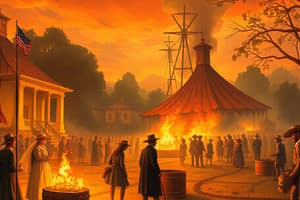Podcast
Questions and Answers
What primary issue led to the division between the North and South in the Antebellum era?
What primary issue led to the division between the North and South in the Antebellum era?
- Slavery (correct)
- Economic disparities
- Cultural differences
- Military alliances
What significant event did South Carolina initiate in response to high tariffs?
What significant event did South Carolina initiate in response to high tariffs?
- Withdrew from Congress
- Formed military alliances
- Protested in Washington, D.C.
- Threatened to secede from the Union (correct)
What was the main belief of the North regarding the federal government during the Antebellum period?
What was the main belief of the North regarding the federal government during the Antebellum period?
- Tariffs should be abolished
- Federal laws should be ignored
- Strong national government should be upheld (correct)
- States should govern themselves
Which of the following was a consequence of the election of 1860?
Which of the following was a consequence of the election of 1860?
What was the stance of Alexander Stephens regarding secession?
What was the stance of Alexander Stephens regarding secession?
Which invention significantly increased the demand for slavery in the South?
Which invention significantly increased the demand for slavery in the South?
What action did Andrew Jackson take in response to South Carolina's threat to nullify tariffs?
What action did Andrew Jackson take in response to South Carolina's threat to nullify tariffs?
In what year did Georgia officially secede from the Union?
In what year did Georgia officially secede from the Union?
What was one of Lincoln's promises to the Southern states in his inaugural address?
What was one of Lincoln's promises to the Southern states in his inaugural address?
Which event marked the start of the Civil War?
Which event marked the start of the Civil War?
What strategy did the Union adopt in response to Confederate ports?
What strategy did the Union adopt in response to Confederate ports?
What was the outcome of the Battle of Antietam?
What was the outcome of the Battle of Antietam?
What was significant about the use of rifled cannons at Fort Pulaski?
What was significant about the use of rifled cannons at Fort Pulaski?
What was a key feature of Sherman's march to the sea?
What was a key feature of Sherman's march to the sea?
What was the main objective of King Cotton diplomacy by the Confederacy?
What was the main objective of King Cotton diplomacy by the Confederacy?
Why did the South fail to effectively follow up after the Battle of Chickamauga?
Why did the South fail to effectively follow up after the Battle of Chickamauga?
What was a major consequence of the Emancipation Proclamation?
What was a major consequence of the Emancipation Proclamation?
What was one of the major effects of the Union Blockade during the Civil War?
What was one of the major effects of the Union Blockade during the Civil War?
What led to the capture and execution of Captain Henry Wirz?
What led to the capture and execution of Captain Henry Wirz?
What was a major outcome of the Battle of Gettysburg?
What was a major outcome of the Battle of Gettysburg?
How many people died during the Civil War, primarily due to disease and military prison hardships?
How many people died during the Civil War, primarily due to disease and military prison hardships?
What was one effect of Sherman's total war strategy?
What was one effect of Sherman's total war strategy?
Flashcards
Antebellum Sectionalism
Antebellum Sectionalism
The division of the United States before the Civil War, characterized by differing interests and values between the North and South, ultimately leading to conflict.
States' Rights
States' Rights
The belief that states have the right to govern themselves and can refuse laws passed by the federal government if they deem those laws hurtful.
Nullification Crisis
Nullification Crisis
A political crisis in the United States wherein South Carolina threatened to secede from the Union in response to federal tariffs.
Election of 1860
Election of 1860
Signup and view all the flashcards
Secession
Secession
Signup and view all the flashcards
Slavery's Role
Slavery's Role
Signup and view all the flashcards
Tariffs & Economy
Tariffs & Economy
Signup and view all the flashcards
Alexander Stephens
Alexander Stephens
Signup and view all the flashcards
Southern Secession
Southern Secession
Signup and view all the flashcards
Lincoln's Inaugural Plea
Lincoln's Inaugural Plea
Signup and view all the flashcards
Fort Sumter Bombardment
Fort Sumter Bombardment
Signup and view all the flashcards
Union Blockade
Union Blockade
Signup and view all the flashcards
King Cotton Diplomacy
King Cotton Diplomacy
Signup and view all the flashcards
Battle of Bull Run
Battle of Bull Run
Signup and view all the flashcards
Battle of Antietam
Battle of Antietam
Signup and view all the flashcards
Emancipation Proclamation
Emancipation Proclamation
Signup and view all the flashcards
Battle of Gettysburg
Battle of Gettysburg
Signup and view all the flashcards
Battle of Chickamauga
Battle of Chickamauga
Signup and view all the flashcards
Sherman's March to the Sea
Sherman's March to the Sea
Signup and view all the flashcards
Appomattox Court House
Appomattox Court House
Signup and view all the flashcards
Andersonville Prison
Andersonville Prison
Signup and view all the flashcards
Civil War Casualties
Civil War Casualties
Signup and view all the flashcards
Total War
Total War
Signup and view all the flashcards
Blockade Runners
Blockade Runners
Signup and view all the flashcards
Study Notes
Antebellum Era Causes
- Slavery: A fundamental disagreement over the morality and legality of slavery, with a growing divide between abolitionists and supporters. Majority of slaves located in South.
- States' Rights: A dispute over the balance of power between state and federal governments. The South believed in states' rights to govern themselves, including the right to maintain slavery. The North favored a stronger national government.
- Tariffs: Taxes on imported goods. The South, relying on imported finished products and exporting raw materials, opposed tariffs, which the North supported to protect its own industries. Tariffs hurt Southern economy while increasing Northern profits. South Carolina threatened secession over high tariffs.
- Sectionalism: Fierce loyalty to one's region (North or South), leading to mistrust and animosity between the sections.
- Election of 1860: Lincoln's election triggered fears of federal interference with slavery in the South and led to secession.
- Secession: Southern states withdrawing from the Union, starting with South Carolina.
Secession in Georgia
- Debate and Division: Georgia faced strong arguments for and against secession in 1861.
- Georgia's Secession: In January 1861, Georgia seceded from the Union by a vote of 208 to 89.
- Confederate States of America: Seceded Southern states formed the CSA in Montgomery, Alabama, with Jefferson Davis as President and Alexander Stephens as Vice President.
Alexander Stephens
- Political Figure: A major figure in Georgia and national politics.
- Advocate for Slavery but Opposed Secession: Stephens supported slavery, but he opposed immediate secession.
- Vice President of CSA: Stephens became Vice President of the Confederate States of America.
Lincoln's Inaugural Address
- Appeal for Unity: Lincoln appealed for maintaining the Union.
- Non-Interference with Slavery: Lincoln promised not to interfere with slavery in existing states.
War Begins
- Fort Sumter: On April 12, 1861, Confederate forces bombarded Fort Sumter in Charleston Harbor, initiating the Civil War.
- Union Surrender: Union troops surrendered Fort Sumter on April 13, 1861.
- Further Secessions: Arkansas, North Carolina, Tennessee, and Virginia seceded after Fort Sumter.
War Strategies
- Union: Blockade Southern ports, capture the Mississippi River to divide the Confederacy, capture Richmond (the Confederate capital), and destroy Southern resources to weaken civilian support.
- Confederate: Use blockade runners to circumvent the blockade. Rely on King Cotton diplomacy to encourage British and French intervention.
Major Battles
- First Battle of Bull Run (Manassas): July 21, 1861. Confederate victory, exposing the lengthy nature of the conflict.
- Battle of Antietam: September 17, 1862. Union victory, considered the bloodiest single-day battle. This allowed Lincoln to issue the Emancipation Proclamation.
- Battle of Gettysburg: July 1-3, 1863. Union victory, a turning point of the war.
- Battle of Chickamauga: September 18-20, 1863. Confederate victory, a major battle in the western theater of the war.
Union Blockade
- Objective: Prevent Southern cotton exports and imports of war supplies from foreign countries.
- Blockade Runners: Private ships successfully evaded Union patrols to transport goods to and from Europe.
- Ironclads: Union navy used ironclad ships (armored vessels) to enforce the blockade.
- Impact on Georgia and the South: Prevented the shipment of vital Southern resources.
Major Events involving Georgia
-
Fall of Fort Pulaski: April 10, 1862. First major Georgia battle, Union victory utilizing rifled cannon.
-
Atlanta Campaign: Late spring-September 1864. Union General Sherman's campaign to capture Atlanta. Confederate loss, allowing Sherman's March to the Sea.
-
Sherman's March to the Sea: Union General Sherman’s devastating march through Georgia. The Union army destroyed everything in its path to weaken Southern morale and resources. This was an example of “total war”.
War's End
- Surrender: April 9, 1865, Confederate General Robert E. Lee surrendered to Union General Ulysses S. Grant at Appomattox Court House, Virginia.
- Union Victory: The Union won the Civil War.
Casualties and Aftermath
- High Casualties: Approximately 620,000 deaths, a significant proportion from disease and hardship.
- Long-Term Healing: Physical and emotional healing took far longer after the war.
Studying That Suits You
Use AI to generate personalized quizzes and flashcards to suit your learning preferences.




